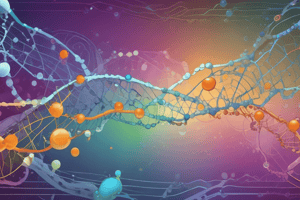Podcast
Questions and Answers
What is the primary role of a gene in protein production?
What is the primary role of a gene in protein production?
- It structures the cell membrane.
- It provides energy for cellular processes.
- It determines the rate of cell division.
- It controls the order of amino acids in a protein. (correct)
Which sequence correctly represents the central dogma of molecular genetics?
Which sequence correctly represents the central dogma of molecular genetics?
- mRNA → DNA → Protein
- Protein → DNA → mRNA
- DNA → mRNA → Protein (correct)
- DNA → Protein → mRNA
How does mRNA contribute to protein synthesis?
How does mRNA contribute to protein synthesis?
- It replicates the DNA sequence.
- It carries the genetic instructions from DNA to the site of synthesis. (correct)
- It directly synthesizes proteins.
- It transports amino acids to the ribosomes.
What is the outcome of the transcription process?
What is the outcome of the transcription process?
Which of the following best describes the relationship between genotype and phenotype?
Which of the following best describes the relationship between genotype and phenotype?
Flashcards
Gene
Gene
A portion of DNA that provides instructions for building a specific protein.
Genetic Code
Genetic Code
The sequence of nitrogenous bases (Adenine, Thymine, Guanine, Cytosine) in a gene.
Transcription
Transcription
The process of copying genetic information from DNA to mRNA.
Translation
Translation
Signup and view all the flashcards
Central Dogma
Central Dogma
Signup and view all the flashcards
Study Notes
The Central Dogma of Molecular Genetics
- Genes control protein production within cells
- A gene is a series of bases sequenced in a specific order
- Genes can contain anywhere from hundreds to millions of bases
- This sequence is called the genetic code providing instructions for protein type
- The genetic material (genotype) is expressed as a characteristic (phenotype)
- In biochemistry, this means producing proteins using DNA as the code
- The flow of genetic information goes from DNA to mRNA to protein
Protein Synthesis
- Involves replication, transcription, and translation
- Hereditary instructions are transcribed from DNA to mRNA
- mRNA is then translated into proteins forming the phenotype of an organism
Studying That Suits You
Use AI to generate personalized quizzes and flashcards to suit your learning preferences.




